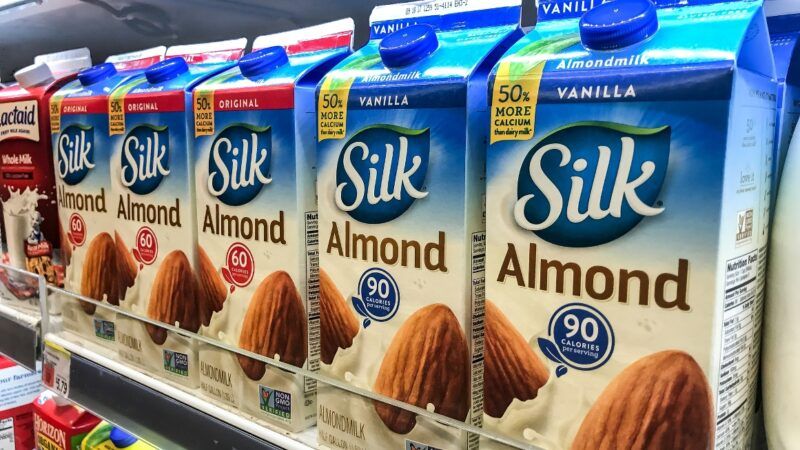Do We Really Need the Federal Government To Tell Us What Milk Is?
Everybody knows what almond, oat, and soy milk are. We don’t need the FDA’s intervention, no matter what the dairy lobby claims.

It appears that the Food and Drug Administration (FDA) is about to crack down on the labeling of nondairy milk products like almond and oat milks.
It's all part of the FDA's silly, condescending treatment of consumers that just so happens to benefit powerful, entrenched agriculture interests using the government to attack competitors.
Wired and Mother Jones report that, based on a draft policy produced by the FDA back in March that has not yet been made public, the agency is preparing to rule that the word "milk" on labels must be confined to animal products. If true, this would mean that almond milk would have to go by another name and cannot be marketed in such a way to suggest that it's similar to dairy milk.
Of course, there is no evidence that anybody is being tricked or fooled by nondairy milk. Nobody is buying it and consuming it by accident, at least not more than once. Nevertheless, representatives from the dairy industry have been lobbying the government for years now to try to get the FDA to do something about this growing competition. And some lawmakers in dairy-centric communities have been pushing for laws to control the use of the term.
A 2019 letter from the National Milk Producers Federation to the FDA shows what's really happening here is that greater numbers of substitute milk products have been coming to the market each year. And the dairy industry contends that consumers are "being misled about the nutritional content of plant-based imitators relative to real dairy products, creating marketplace confusion and inappropriately blurring well-defined standards of identity."
The nutritional contents of dairy milk are obviously different from the nutritional contents of nondairy milk, and the Federation argues that consumers don't understand this and many think that this "fake" milk is healthier and "more nutritious" than dairy milk. From a reasonable perspective, this would seem to be a matter of opinion or interpretation, but the Federation insists that their product is objectively healthier and that this "confusion," no joke, "creates a public health issue by causing harm to our nation's children and, potentially, other consumers."
While one definition of milk is a fluid excreted by an animal's mammary glands, it has for centuries also applied to some of these other substitutes. Almond milk may seem like a new trend, but it in fact dates back centuries.
It would, of course, be crass to blatantly demand that the federal government pursue a regulation just for the purpose of attempting to suppress a competitor, and so there are these attempts to manufacture a public health crisis over which drink is more "nutritious" and which, therefore, should have control over the term.
No, this makes no sense. But this is the result of allowing the federal government to control not only the labeling of the foods we consume but also the proper "identity" of those foods. We've seen the silliness of the FDA's overregulation of food contents in debates over what should be in French dressing and how many cherries should be in frozen cherry pies (and only frozen cherry pies).
In May, a small but bipartisan group of lawmakers sent a letter to the White House Office of Management and Budget (OMB), the agency that would have received the FDA's guidance letter back in March, arguing that there's no justification for getting involved in a fight over what gets to label itself "milk." The authors, Sen. Cory Booker (D–N.J.), Sen. Mike Lee (R–Utah), Rep. Julia Brownley (D–Calif.), and Rep. Nancy Mace (R–S.C.), note that the FDA does not use nutritional value as part of its "standards of identity" and point out that dairy milks can vary wildly in its contents based on the animal of origin.
"[The] FDA has not previously asked producers to disclose other wide variations in nutritional components—including among milks derived from different animals. Goat milk, for example, has less folate, zinc, riboflavin and vitamin B12 than cow milk. Buffalo milk has twice as much saturated fat as cow milk, as well as considerably more calcium," they write. They argue that it would be discriminatory to apply these standards to plant-based milks as a justification for regulating their labels if they're not going to do the same to animal milks.
We've seen examples of the dairy industry doing exactly this as well, though. In Florida, the state (encouraged by the dairy lobby) attempted to stop a small dairy company from calling its skim milk "skim milk" because it didn't add vitamin A to its skim milk. To be clear, the milk was the very definition of skim milk, but the state's standard of identity for it to legally be called "skim milk" required the added Vitamin A. The dairy company fought this attempt, with the assistance of the Institute for Justice, and eventually won in federal court.
If members of the dairy industry are so worried about the competition from the growth in plant substitutes, they can always buy an almond orchard and make their own brands. Using the federal government to try to police the product with absurd claims that there's a crisis and that people are being tricked is utter nonsense. These competitors market their products on the very fact that they aren't dairy milk. That's the whole point, and everybody knows it.
Show Comments (64)